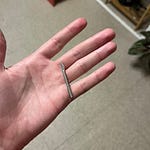With June only a few weeks hence, kink at Pride discourse is peaking like the rusty tail car on an ancient roller coaster: We know the drop is coming, but no amount of preparation can save us from the whiplash.
Today’s DAVID isn’t about all of that, both because it’s readily available (we’ve been having variations on this respectability argument since before the brick was thrown), and because I’m optimistic that if you’re here with me now, you don’t need convincing. Which isn’t to say that it’s not worth asking why we need to be protected from so-called public so-called displays of so-called kink by the police (note those last three words, the issue’s almost-always unspoken core). But once you’ve recognized the pattern within which this question fits, you tend to become more interested in the system than its symptoms.
There are probably bigger fish to fry than whether and how queer, trans, feminized, racialized, sexualized, poor, disabled, and otherwise deviant bodies negotiate public spaces allocated for Pride™. From the brutal spike in violence against occupied Palestine to the ongoing mobilization against the police state here in the USA, there are more pressing concerns than whether it is “okay” for me to wear a harness at a parade that I wasn’t going to attend anyway. But as we know, the framing of “kink at Pride” obscures the real question about who else gets to be in attendance. ACAB but we need police to protect us from the naked gay men is a deadly relevant contradiction in the struggle against white supremacist colonialist hegemony.
While these conflicts may be nothing new, with our culture being what it is—especially when exacerbated by the pseudo-anonymity of the internet, generational differences, media and historical illiteracy, and ambient fascistic ideologies—they seem to be worsening. The season for online arguing about who is welcome at Pride and whether that’s pedophilia, actually, seems to be expanding, and for once, we can’t blame it on climate change (directly, anyway).
So let’s think of the cringe that public sex inspires as the bellwether for larger cultural shifts and conversations. Which way is that little guy headed? Not Tennessee, if he knows what’s good for him.
In part 1 of this series, I wrote about the way that the Fifty Shades of Grey film franchise has become a cipher for people who position BDSM as both dangerous and cringe. In part 2, I wrote about the ways in which affect theory can be a helpful means for approaching cringe as a temporal construct grounded in capitalist feeling. For this final chapter, I want to branch out a little from cringe itself into other words and phrases whose use in relation to kink I want to complicate and explore: don’t yuck my yum, vanilla, and kinkshame.
Within leather subcultures, these words and phrases are used to talk about concepts specific to those cultures. Though they mean one thing while used in-community, outside it, they’ve come to mean something else. “I’m definitely going to yuck this yum,” someone might joke of another’s desire to drink the renal ambrosia. “Vanilla is a slur,” someone else might claim as a part of their whorephobic, transphobic, racist, and misogynist campaign to narrow the window of what women can and can’t sexually consent to. “Don’t kinkshame!” we tease when sharing a personal proclivity that’s really not at all that shameful, or else when the media tantalizes us with the possibility of a presidential piss tape.
What’s wrong with non-leatherpeople using these terms? Nothing, and even if there were, there’s nothing I can do to stop them (nor do I want to. When I say ACAB, I mean it). But when not being used to communicate internally and in good faith among people with a stake in community, these words adopt different meanings, reflecting different values and moods. They become, in effect, different words.
Don’t yuck my yum is used among kinky people as a reminder of how to express our desires in the company of other kinky people. Whether someone’s desire is very taboo, like scat play, or something that’s merely not your style, expressing that you don’t do it because you simply don’t want to—not because it’s inherently bad or immoral—is how we show respect and avoid replicating the stigmas that affect all of us1. For example, I have an intense aversion to sploshing, but I have many friends who like it or do it for work. I show them respect not by saying that sploshing is inherently disgusting or evil or degenerate, but that I don’t care to do it.
Vanilla describes the people who don’t share our affinities for non-normative intimacy and/or don’t identify themselves with leather. Like the word “cis,” vanilla is not a slur, nor does it designate an oppressed class. As I wrote for my validity series, there is no structural pressure on anyone to ~be kinky~. White cis women who are angry about their male partners insisting on “kinky” sex that they don’t want will not end gendered violence by positioning themselves as victims of leather culture. Further criminalizing BDSM, pornography, sex work, public sex, immigration, and transsexuality will not make any of those women safer, or if it does, that safety will be secured by the ceding of both individual and collective power. Does it make sense to locate the problem of violent straight men in a primarily queer subculture based around consensual non-normative sex? If you’re committed to reducing that violence, why is your solution to outsource it to the policing of people who are likely already vulnerable to the violence of the system? The fact of the matter is, as reception of media like Fifty Shades of Grey demonstrates, that what gets defined as transgressive or dangerous is as much about who you are as what you’re doing. When straight people do it, it’s less kinky2. This is not because straight people can’t be kinky, but rather because what makes kink transgressive is that it is not claimed by the norm. Because claiming it has consequences, sometimes quite dangerous ones. Many of us with the advantages of straightness, whiteness, class, etc. are loathe to sacrifice them by aligning ourselves with deviance. In terms of power and safety within the system, there’s nothing to gain by being kinky rather than being vanilla3.
Kinkshame is a lot like yuck/yum in that it describes the shaming of an act that you, yourself, have a different subjective reaction to than another player might. If I choose to kinkshame someone for their amorous feelings about feet, while I myself enjoy fisting holes, one might wonder where the fuck I get off deciding that feet is bad and fist is good. Again, this is about respect within community: We choose to be respectful in our language because we respect those to whom we speak. Any response to asking people to use respectful language as some kind of prescription, or even punishment, should be highly suspect4.
Now, if you get off by being a voyeur without consent, to shame you for such would not be a shaming of the kink of voyeurism, but of your desire for nonconsensual sexuality with other people. The shame doesn’t go with the kink, but with the abuse of power. One might even suggest that “kink” describes an exclusively consensual category, and so kinkshame can’t be used for an act that is not done with consent with all parties, similar to the way that while sex and rape might look similar, or even identical, one is predicated on consent and one isn’t. I could be convinced otherwise, but that’s how I use these terms, anyway.
When in-community terms take on different meanings outside community, they aren’t being co-opted, but rather misappropriated. Like gatekeep, gaslight, and valid, these words and terms have come to embody almost contradictory meanings than the ones they have for leatherpeople. Like other shibboleth words and concepts—lover comes to mind—that enter the mainstream as punchlines, they’re mostly deployed sarcastically, as if we’re all in on it together and as if our mocking of how “gay” Trump and Putin are together, of how outlandish Armie Hammer’s cannibalism fetish, of how freaky T.I.’s interest in his daughter’s virginity are, are on par with their abuses of power and consent. As if normative sex, and everything it touches—gender, intimacy, money, family—is not carefully and painfully imposed and disciplined into all of us.
While cringe has been the purported subject of this DAVID series, I think what I really wanted to explore was the difference between what happens within a community and what happens without, and why people struggle so much to distinguish between the two. Why does this matter? Because a lot of us, including our own youth, have been hoodwinked into believing that hypervisibility and “representation” has changed a culture that remains fiercely queerphobic and sex-negative. In my eyes, the relationship of this kind of entitlement, by means of cultural commodification, to a general failure to understand what consent means and constitutes, is undeniable.
David tweets at @k8bushofficial.
Subscribe to support our mutual aid project, GOOD ADVICE/BAD GAY, a bimonthly advice series from an anonymous gay therapist who’s not afraid to hurt your feelings with the truth. Sample an unlocked post for a taste of what you’re missing.
There are shades of grey here, of course, as I’ve addressed in the past, most recently with my series on controversial fantasies.
I’d hazard to say the same for those who occupy other positions of relative power, like white people, etc.
This approaches the question of whether we can understand being kinky as some kind of subaltern position to being vanilla, a conception of structural power and vulnerability along the lines of straight and gay or white and black. I would say not, but I don’t want to get into that here today. Some other time perhaps!
While not the same issue, I think of the choice not to use slurs in this same vein. I am not being oppressed by someone requiring that I respect their desire for me not to use slurs directed toward them in order to interact with them. I am not being oppressed by being required to maintain standards of actual decency in order to have rhetorical access to someone else. This give-and-take constitutes the mutuality of real community, to which as Americans, especially white Americans, we are trained to be hostile.












